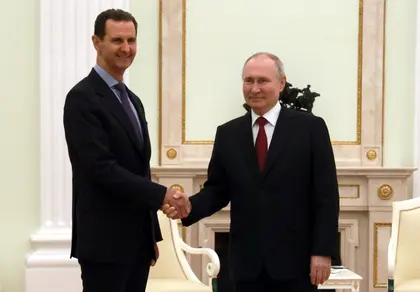Syria’s dictator Bashar al-Assad is moving to assist Russia in committing genocide against Ukrainians. In a recent meeting with Russian dictator Vladimir Putin in the Kremlin, Assad repeated the lie that Russia is fighting neo-Nazis and “old Nazis” in Ukraine and offered the Russian dictator his help.
As the relationship between the two dictators intensifies, the commonalities shared by the wars are worth considering. Doing so may help prevent the continued destruction of the Syrian and Ukrainian nations. It may also help pave the road to sustainable peace.
JOIN US ON TELEGRAM
Follow our coverage of the war on the @Kyivpost_official.
On the outset, three key differences between the two ongoing wars must be understood:
1) The Syrian war is a civil war. Syria’s dictator invited Russia to help him kill those Syrian citizens who posed a threat to his power. The war in Ukraine is an international war involving aggression by one state against another. Russia invaded Ukraine because it does not believe Ukraine has a right to exist outside of its black matter empire.
2) The United States gained air superiority in Syria and actually bombed targets in Syria. To date, the U.S. and other Ukrainian allies refuse to accept Ukraine’s pleas to supply jet fighters or close Ukraine’s skies. Notably, Ukraine’s request to have a foreign ally close its skies, is unprecedented in our post WW2 era.
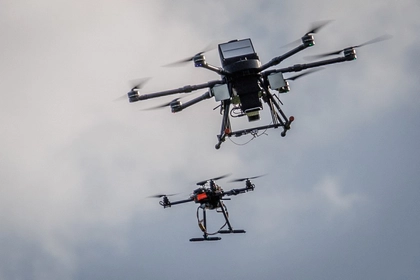
Ukraine Reportedly Strikes 4 Alcohol Distilleries in Russia in Drone Attacks
3) There is no common enemy Syria, Russia, the US and allied states want to destroy in Ukraine. In Syria, there is a shared common enemy, namely ISIS. Syria, Russia, the U.S. and allied states have an interest in destroying that enemy. In Ukraine, with the exception of Kadyrov Muslims, no radicalized Muslim formations exist.
Russia Declares Proxy Wars.
In 2011, both Russia and Syria experienced massive protests. Both perceived the demonstrations as organized by the U.S. Both also perceive the U.S. as a global evil -aggressively abusive capitalism backed by an Israeli lobby. These perceptions play a key role in establishing partnerships against democracies.
The Russian military intervention in the Syrian civil war began in September 2015. The Syrian government requested Russian military aid against rebel and jihadist groups. The ongoing conflict in Syria is widely-described as a series of overlapping proxy wars between the regional and world powers, primarily between the U.S. and Russia as well as between Iran and Saudi Arabia.
Russian propaganda puts forth that the war in Ukraine is a war between the U.S., NATO and Russia.
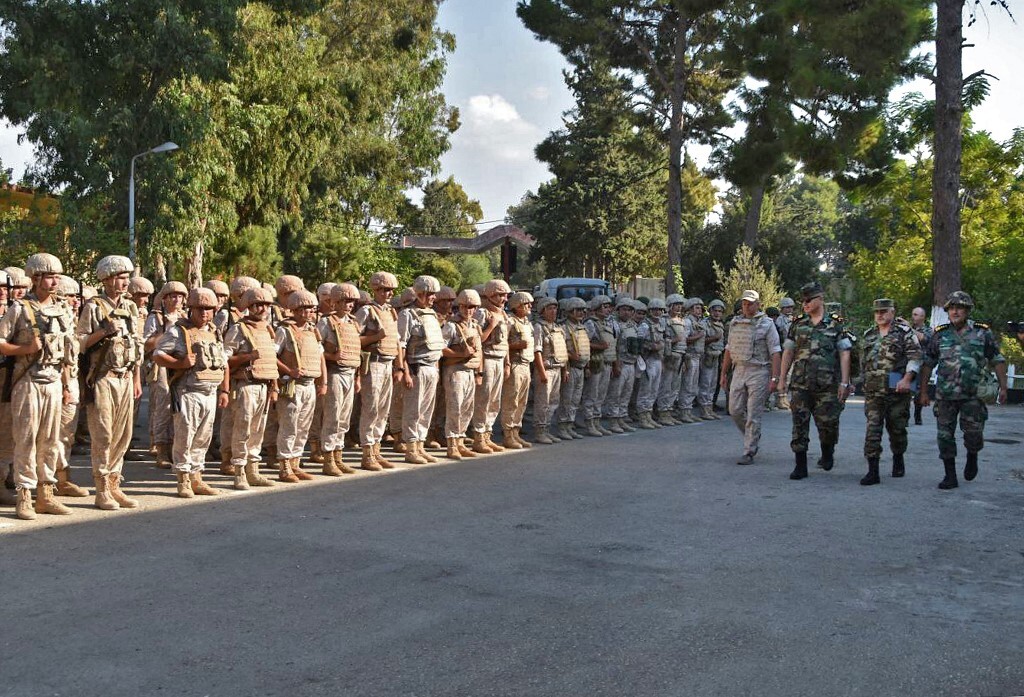 This handout picture released by the official Syrian Arab News Agency (SANA) on October 13, 2022 shows Syrian and Russian soldiers taking part in joint military drills at the Tartus naval base along Syria's Mediterranean coast.SANA / AFP
This handout picture released by the official Syrian Arab News Agency (SANA) on October 13, 2022 shows Syrian and Russian soldiers taking part in joint military drills at the Tartus naval base along Syria's Mediterranean coast.SANA / AFP
But Ukraine is not a proxy war.
Russia really did invade Ukraine in 2014 and started a full-blown brutal war of aggression against its neighbor in 2022.
Both wars reek of genocide
Deliberately inflicting upon a group conditions of life calculated to bring about its physical destruction - in whole or in part - is a key element of genocide.
Hundreds of thousands of individuals have been killed in Syria. So many, in fact, that the United Nations even stopped counting Syria’s dead. In Ukraine, the United Nations admits their counts of deceased are considerably lower than in actuality. This is particularly due to their lack of access to Russian occupied territories.
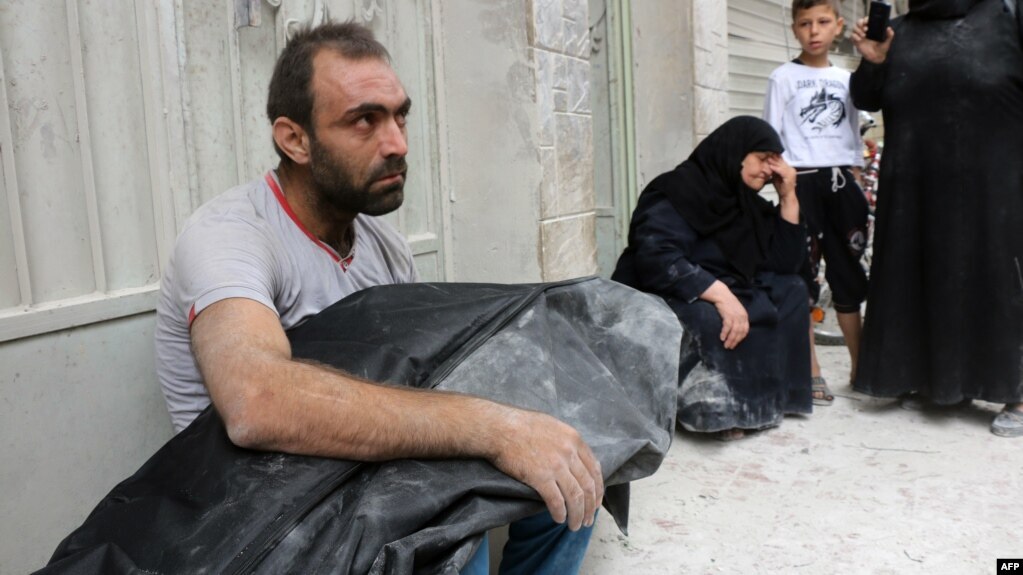 A Syrian man carries the body of his nephew following a reported air strike in Aleppo on September 23, 2016. AFP.
A Syrian man carries the body of his nephew following a reported air strike in Aleppo on September 23, 2016. AFP.
A key difference here is that Assad is committing genocidal crimes against his own citizens. Russia is committing them against a foreign nation-state. When Assad will team up to help destroy Ukrainians both will become co-conspirators.
The citizens of both states have been subjected to serious bodily and mental harm. Systematic rapes, torture, deportations, and summary executions are commonplace. The acoustic terrorism related to sirens has a lasting impact on individuals. Particularly children.
An entire future generation of children has been irreparably harmed. In Ukraine, it is estimated that in one year, already 1,000 children have been maimed and killed and possibly over 230,000 illegally deported to Russia. In Syria, the number of child deaths may be as high as 30,000.
Their respective refugee crises have led to both states losing millions of their citizens. The chances of these individuals ever returning home are highly improbable. In contrast to Syria, Ukrainian men are being mobilized and are prohibited from fleeing the country. The fleeing women and children have thus been effectively separated from their men, thus the impact on Ukraine is distinctive.
Prohibited Methods of War
In 2017 the Office of the United Nations High Commissioner for Human Rights (OHCHR) reported that Russia used cluster and incendiary weapons in Syria, constituting the war crime of indiscriminate attacks in a civilian populated area. OHCHR also found Russia guilty of war crimes in Ukraine in 2022 and 2023.
Incendiary weapons are prohibited by the Geneva Convention, the provisions of which are binding on all countries involved in military conflicts. White phosphorous bombs have been employed by Russia and provided to Syria. Cluster bombs, widely banned cluster munitions, have been used against both Syrians and Ukrainians.
In Syria, serious claims evidence the use of chemical weapons: sarin, mustard gas and chlorine against civilians. In Ukraine, although their use on the battle zone has been rumored, no evidence supporting their use has been made public.
Scorched earth policies are evidenced most clearly by the complete destruction of Aleppo in Syria and Mariupol in Ukraine. Although these two razed cities are beacons of the ruthlessness of scorched earth policies, they only evidence what has happened to thousands of villages and towns within the two states.
International and national courts outside Syria and Ukraine have begun the prosecution of war crimes. Putin is now a wanted war criminal; Assad remains free of this “symbolic” title.
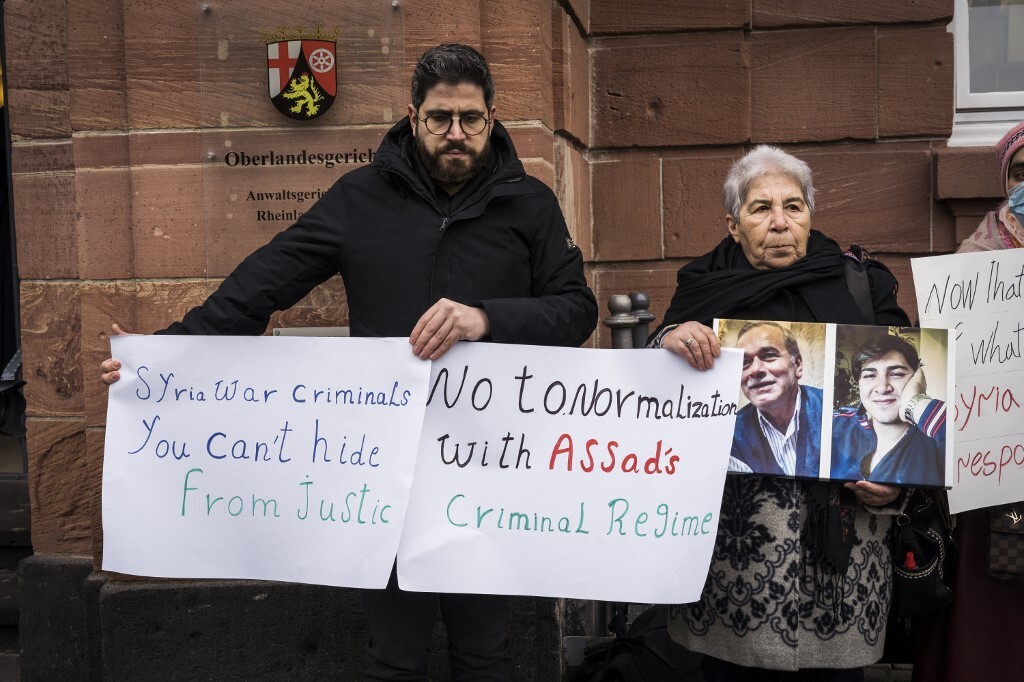 People hold posters and photographs during a demonstration outside the courthouse where former Syrian intelligence officer Anwar Raslan stood on trial in Koblenz, western Germany, on January 13, 2022, after the verdict was spoken on charges for crimes against humanity. The court in Koblenz sentenced Raslan to life in jail for crimes against humanity in a "historic" verdict marking the end of the first global trial over state-sponsored torture in Syria.Bernd Lauter / AFP
People hold posters and photographs during a demonstration outside the courthouse where former Syrian intelligence officer Anwar Raslan stood on trial in Koblenz, western Germany, on January 13, 2022, after the verdict was spoken on charges for crimes against humanity. The court in Koblenz sentenced Raslan to life in jail for crimes against humanity in a "historic" verdict marking the end of the first global trial over state-sponsored torture in Syria.Bernd Lauter / AFP
Wagner Group
Widely accepted as the silent arm of Russia’s armed forces, the brutal Wagner group continues to play a significant role in both wars. The Wagner group’s sledgehammer brutality has been demonstrated widely in Syria and Ukraine. The so-called private military corporation has been sanctioned by a number of countries, as well as the EU, for its activities in both countries.
Syria was used as a testing ground for the silent arm of Russia’s armed forces. In Syria, it is claimed that the Wagner group receives a 25 percent cut of oil sales from the fields it holds under its control. In Ukraine, there are no opensource documents attesting to similar activities, but their role in the hijacking of Ukraine’s resources including the largest nuclear plant in Europe (third largest in the world), calls for scrutiny.
Russia’s wars are expanding its naval power
Moscow still considers its presence in Syria a valuable asset, and sees its alliance with Damascus as an important bargaining chip in talks with the West.
Through its wars, Russia has managed to establish strategic military bases in NATO’s backyard. It has gained an extraordinarily long, 49-year lease of the Russian naval facility in Tartus. This lease echoes the scandalous “extension” of Russia’s Black Sea Fleet “agreement” with Ukraine.
That agreement helped Russia steal Crimea.
Turkey, the NATO member loftily nestled between the Black and Mediterranean Seas (with Ukraine to its north and Syria to its south), is a naval power not to be ignored. It could play a decisive role in resolving the Syrian conflict. Moscow has attempted to organize a dialogue between the two states.
Ankara is not showing any ambition to oust Assad. Its upcoming May elections may be playing a role. Worrisomely, the West also appears to be thawing to Assad - despite its condemnation of his atrocities.
Putin emphasized the Russian military's “decisive contribution” to stabilizing the country as he welcomed Assad. Assad thanked Putin for “backing Syria's sovereignty and territorial integrity,” noting that the Kremlin's support has remained strong despite the fighting in Ukraine.
The impunity of these dictators is helping them, and others like them, accumulate power.
As a result, slowly far beyond the Black Sea Region into the Mediterranean and the Atlantic, Russia’s black matter imperialism continues to grow.
You can also highlight the text and press Ctrl + Enter


